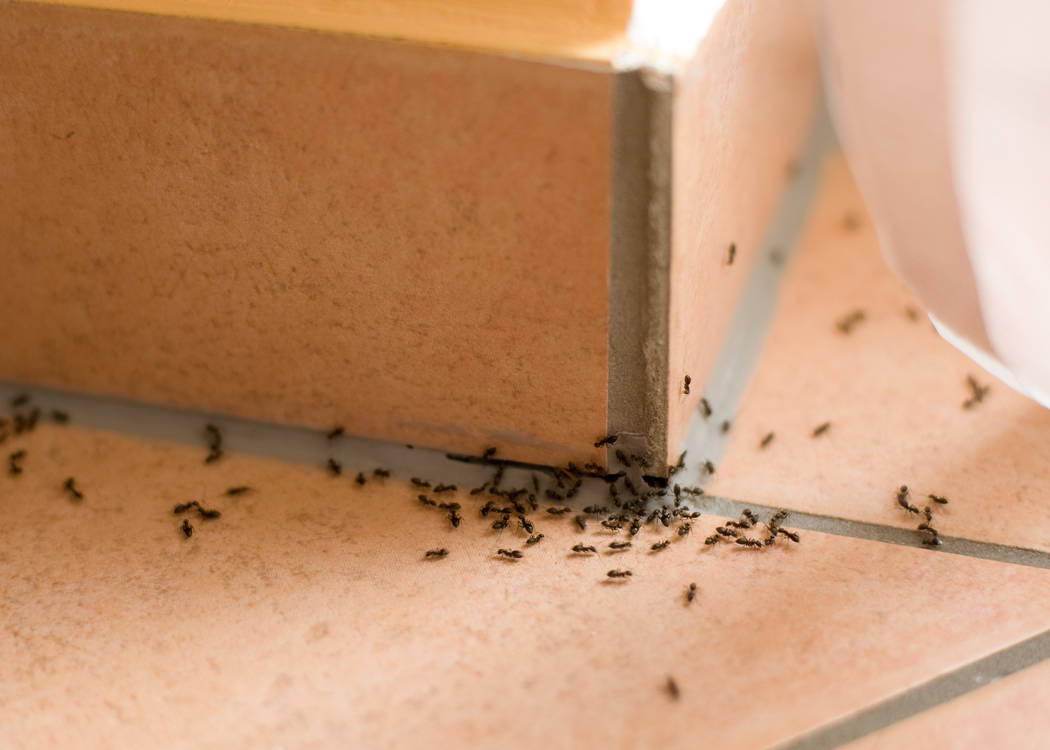As temperatures rise, so does the infestation of bugs
Ants and crickets and scorpions! Oh, my!
Dorothy of “The Wizard of Oz” fame would be aghast if she knew what was crawling around Southern Nevada homes these days. And as the heat increases and these varmints start looking for shade and water, Dorothy’s “Oh, my” is a call for help from a local pest control company.
Before making that call, start by keeping a clean house, because a clean house isn’t as inviting to ants, crickets and scorpions as one that is unsanitary or unkempt. It is common knowledge that pests are always seeking water, food and a hideout. Eliminate any of those and you have less of a problem.
Clean the kitchen at night. Put away dishes. Do not leave food out on the table. Plug up holes in the walls. Sweep and vacuum the entire house every two to three weeks.
And if that doesn’t keep those pests at bay, then it’s time to call an exterminator.
“We see everything, including roaches, earwigs, centipedes, spiders, bees and even bedbugs,” said Jason Mayers at Pitbull Pest Control. “My job is pest management and will do everything to keep them out of a person’s home. Our products are tested and approved by the Environmental Protection Agency, carefully regulated by the state of Nevada and are pet and people friendly. Just about everything we use is effective in keeping pests outside of the house.”
But then there are scorpions.
“Most insects walk on the powder or the spray that we distribute around the house,” Mayers said. “They walk on it and the poison is ingested into their system, and they die or they carry it back to the nest.
“However, scorpions are different. They stand on the tips of their legs. We call it stilting. So this becomes more difficult, and we deal with them in a completely different manner. What is important is to eliminate their food source and remove any clothes or cardboard or anything that enables them to hide or find a home.”
Mayers advises checking seals on the bottom of garage doors to make them tight and flush against the garage floor, and to check weather stripping on all doors and windows. A well-maintained yard is also a deterrent to insects.
“Rosemary bushes smell great and make nice hedges, but they attract bees,” Mayers said. “And swarming Africanized honeybees are becoming more of a problem here. They pollinate like European bees and, for the most part, don’t bother anyone. But they’re very protective of their hive and will attack if threatened.
“Keep all shrubs trimmed and don’t let leaves and other debris gather in the yard. And, definitely, trim away dead fronds from palm trees.”
It isn’t just the small pests that Mayers controls. He also deals with pigeons and rats.
“People don’t realize that pigeons carry up to 60 diseases, and 14 are transmutable to humans,” he said. “And of those 14, eight are known to be deadly. They’re not only a health concern. They’re dirty. (Pigeons’) droppings can cause people to slip and fall, and their droppings are caustic, which eats through many different roofing materials.”
Mayers explained that as construction pushes further into the desert, more pests are going to come to the forefront.
“We’re eliminating their natural food source as we invade their territory,” he said. “We’re altering their way of life, and the desert is their prime habitat. Scorpion and spider nests, which have been dormant for years, are disturbed, and they need to go somewhere. So they move into the newly built homes or apartments or office buildings.”
And if that isn’t enough, get ready for termites.
“In about 10 to 15 years, I expect termites to be a problem,” he said. “It’s not a major concern now because naturally occurring asbestos and caliche deposits in the soil make it difficult for them to exist here. But the more land that we turn over, we’ll be adding termites to our pest control list.”
Old wives' tales for pest control
■ A quick spray from a can of Raid will kill just about any bug or creepy crawler. But some conscientious homeowners prefer homemade concoctions to eliminate pests such as mice, cockroaches, ants and flies. Do they work?
■ Vinegar does eliminate fruit flies. Flies are attracted by the sweetness of rotting or decaying fruit. A cup of vinegar covered with plastic wrap with a hole in it is effective in combating a fruit fly infestation.
■ Do not bait your mousetrap with cheese. Instead, bait it with peanut butter. It is believed that the idea of cheese came from the old cartoon where Tom the cat tried to attract Jerry the mouse with cheese.
■ Spraying peppermint oil on webs will not get rid of spiders. The thought is that, when the web is sprayed with peppermint oil, the spider will go away. Well, the spider will go away — but to another part of the house, where it will build another web.
■ Go ahead and use bay leaves around flour, rice and other dried pantry staples to keep pests away.Place the leaves directly in contact with the food or tape the leaves around the canisters. While bay leaves are a deterrent, they are not a substitute for cleaning the pantry of spilled products.
■ A Southern wives' tale advises sprinkling grits on the counter as a barrier against ants. False. The idea is that the grits will expand in the ant's stomach and they will die. In fact, the grits become a food source, and the ants will be attracted rather than deterred.


















